pages, patterns, and everyday rebellions
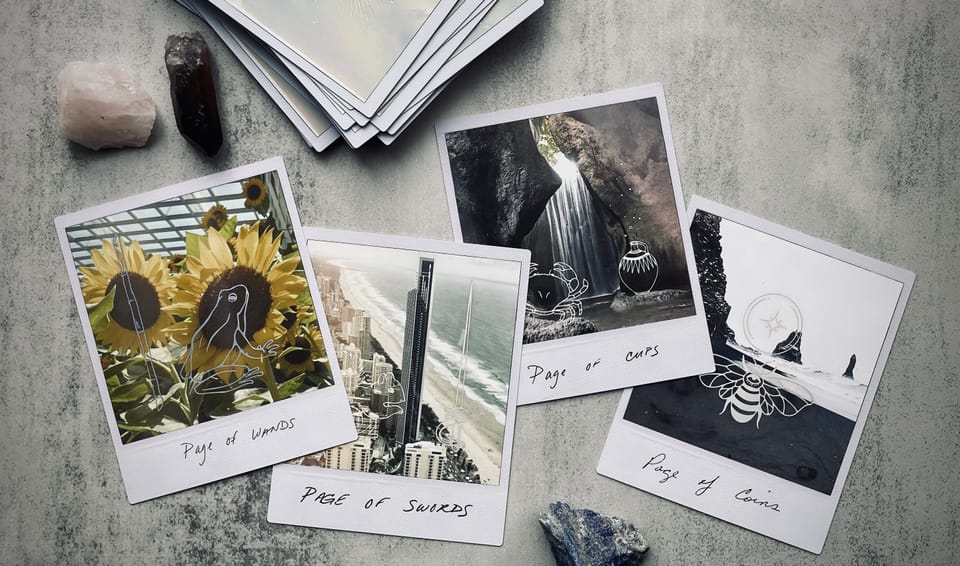
hello, friends. earlier this month in a piece for paid subscribers, i mentioned building patterns of resistance as part of a daily practice. our numbers for this month can speak to the necessity of flexibility in an ever-changing world, and the ways that different routines can help us find stability even when the ground under our feet keeps shifting.
writing this missive got me thinking more deeply about what it means to practice disobedience, to challenge the status quo, to make rebellion part of the everyday — and how we can use tarot to help ourselves continue to question, make change, and approach obstacles from a flexible mindset. it felt right to put together a second essay for this month for everyone, offering some pathways into intentional disobedience with the help of some of my favorite tarot rebels: the pages.
depending on your brain and your personal history, words like rebellion or resistance or disruption might feel intimidating, scary, or even downright dangerous. here in the united states, we're trained from a very young age to follow the rules and conform: from the routines of public school mirroring the schedules of 9-5 workers, from being taught to ask permission to care for our bodies in the most basic of ways during work or classtime, from being shushed or silenced or dismissed when we require accommodations, obedience is drilled into us. and often, we're praised or rewarded for this ability to fit in, stay quiet, and do what we're told, even when that obedience causes us harm.
if you were raised in a high-control religious environment, the stakes may feel even higher. this kind of submission and deference is framed as a requirement for eternal salvation, giving even the smallest instances of disobedience a very heavy cost. and of course, if you live in a marginalized body, you know well that even the strictest adherence to the rules won't necessarily protect you from harm, however undeserved.
none of this is by accident. it's very important, especially under fascist rulers like trump, for the masses to be terrified of speaking up, fighting back, or acting outside of expectations. general reluctance to make waves or break from the status quo is essential for those in power to stay in power. and when leaders make very public examples of innocent people being unfairly punished or eradicated, it's a way of threatening all of us: obey, or else.
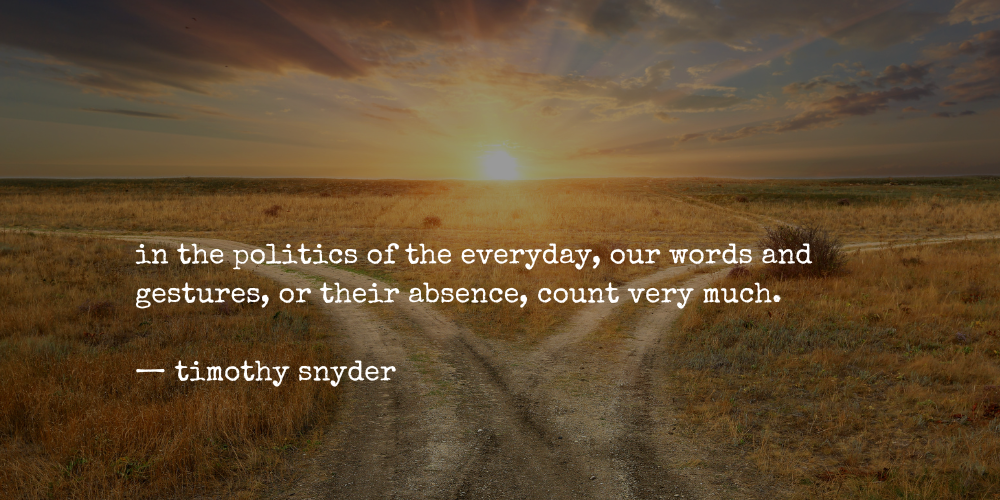
this is an essential reality to acknowledge as we consider where we are and where we are going: for most people, it's easier to continue to conform and stay quiet, to not ask questions, to keep the peace. most people believe that by keeping their mouths shut and their heads down, they will stay safe.
but here's the thing — we are not most people. you are not most people. and the more we practice the art of disobedience, the more we train our minds and bodies to intentionally break arbitrary rules, the easier it becomes to come up with creative solutions to problems, imagine new kinds of futures, and stand up to those in power in more dramatic ways. following the rules is not a guarantee of safety — and if the rules themselves are immoral, why would we want to follow them anyway?
the tarot has plenty of figures who can teach us about rebellion, or who invite us to reconsider how things have always been done (and why they've always been done that way). the fool, the empress, the chariot, the hermit, the hanged one, the devil, the tower, the star, judgement, to name just a few — every one of these archetypes can serve as an invitation to walk a new path, express ourselves openly, break through barriers, start a new journey, change our perspective, let something come crashing down, reimagine the future, or forgive ourselves for who we used to be.
but for my money, some of the most rebellious figures in the deck aren't in the major arcana at all, but instead live amongst the court cards, down here on earth with the rest of us. pages, the youngest and least experienced members of the court, can teach us a lot about disobedience, asking questions, trying new things, and being willing to fail.
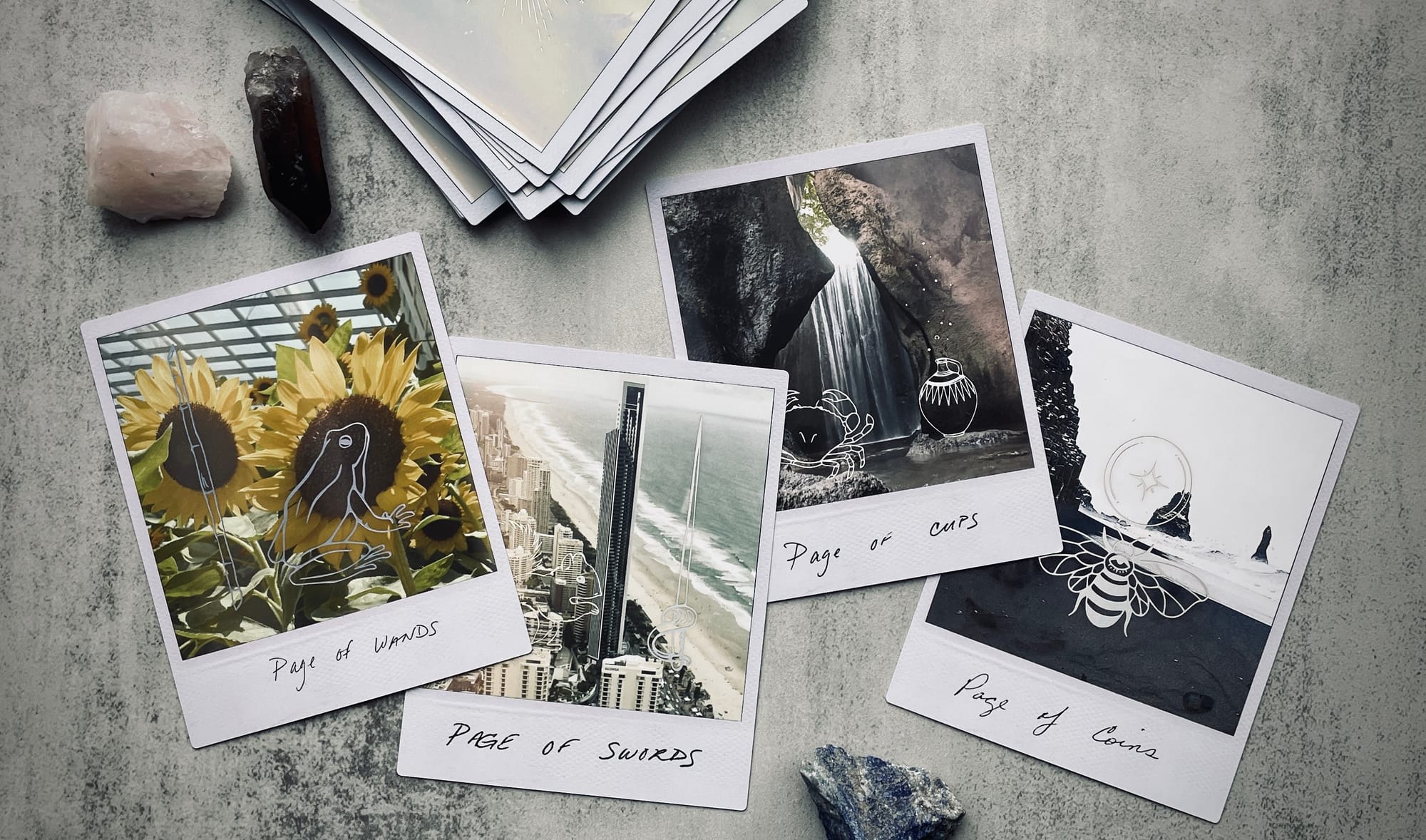
if you're less familiar or comfortable with the court cards, it might be helpful to think of the pages in the tarot as children, students, interns: people who know a few things, but not everything. pages are new here, and are trying to figure shit out. pages unapologetically interrupt you to ask questions. pages wander off and get into something they shouldn't. pages wonder why something has to be done a certain way. pages color outside the lines, explore forbidden places, ask if they can touch the hot pan just to see what happens. pages aren't ruled by expectation or tradition, by the unspoken rules, by the way that things are done around here.
to be a page is to be a bit of a menace (complimentary).
for some, embodying this energy will feel as natural as breathing. but for others, even the thought of behaving like this may be stressful, irritating, something to be instinctively rejected. your response to the pages, and to rebellion in general, is not good or bad, positive or negative — it's just part of who you are, how you were raised, and how your brain works.
pages can push our buttons, challenge our perspectives, force us to slow down and find answers when we don't really want to. but regardless of who you are, working with the pages, embracing and embodying the pages, finding delight in the pages, can help us locate and embrace this energy within ourselves — and activate it more consistently, in whatever way makes sense for us, as often as we need to.
in what ways are you brave? in what ways are you different, weird, strange? in what ways are you loud, disruptive, too much? when do you get shushed or slowed down, told to be patient or to wait your turn or to stop asking so many damn questions? what is a time that you stood up for yourself or someone else, for an idea or a need, for a group of people or an animal or a place or a resource? how have you challenged ideas, assumptions, rules, orders? what did it look like for you to do that, and what did it cost? would you do it again?
no matter who you are, there are so many ways that you can practice disobedience — and that potent, personal rebellion starts in the everyday.

spending too much time on social media will eventually show you nothing but critics, even from people that you politically or ethically might completely agree with — complaints that every digital platform is bad, that protests aren't big or disruptive enough, that petitions don't matter, that representatives don't listen, that boycotts can't be sustained, that the systems cannot be reformed, on and on and on. criticism is not the enemy here, since no action is perfect. but as prisonculture so succinctly stated on bluesky, "we don't actually know what will work. that means that lots of things could work. the possibilities exist."
if rebellion feels uncomfortable for you, or if you're very experienced at rebellion, it might feel easier to criticize than to get in there yourself.
it's way harder to take a chance, to put yourself out there, to lend your voice or your ideas or your body to a cause. but that's why this kind of work is so important: because we need your mind, your creativity, your experience, your ideas. we need your talents, your skills, your resources. we need your ability to do something, even if your inner dictator is telling you that you shouldn't. we need you, just as you are, showing up and getting connected and trying things that might not work and learning from the experience, and then trying again.
there are a lot of ways to show up, to take action, to make a difference. it's fine if your best role isn't on the frontlines as a disruptor or offender — neither is mine. i know it's easy to get caught up in the drama and courage and visibility embodied by the folks who are chaining themselves to buildings or screaming at cops or getting arrested (and trust, those people need our support and our encouragement!). but don't minimize your contribution, or let your inability to show up in person to demonstrations and protests and direct actions keep you from doing other essential, powerful things.
it can be overwhelming to realize how may paths forward there are. but in my own life, embracing the fact that i am uniquely suited to be a healer and a tender has helped me immensely in not feeling guilty for the things i can't participate in, while empowering me to lean all the way into the things i can do.
you have an important part to play too, one that utilizes your unique skills and talents, one that you can start to cultivate right now.
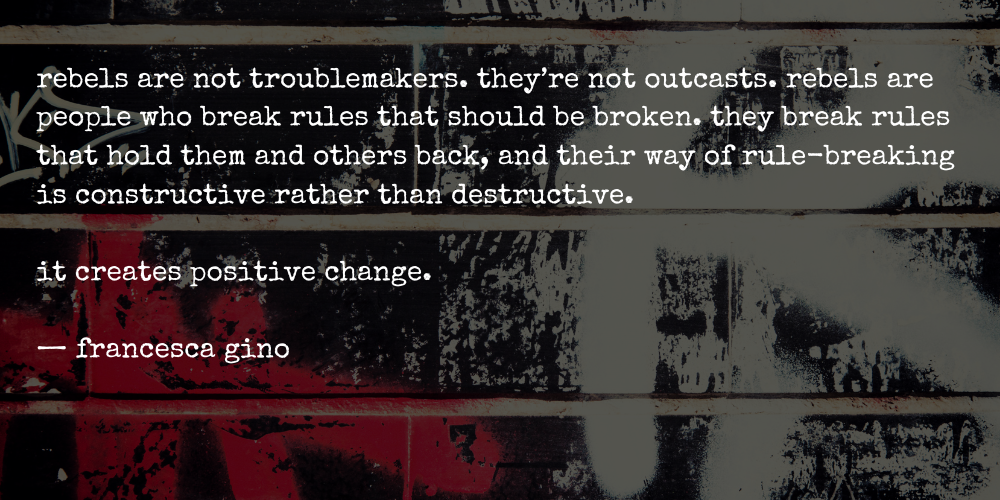
leaning into natural skills and instincts, exploring what is right at our fingertips, figuring out where we fit: this is exactly what pages do. it's what they're built for. which means that finding your personality and your talents and your abilities within the pages, recognizing the ways that you yourself already approach situations with unexpected ideas or unconventional solutions, can help you figure out what your own spirit of disobedience might actually look like.
are you passionate and bold, halfway through an action before you've even actively decided to do it, easily and eagerly pushing back at any restrictions, like the page of wands? are you curious and inquisitive, never satisfied with answers no matter how in-depth, able to gather and share and archive information as easily as breathing, like the page of swords? are you idealistic and emotional, refusing to quiet your feelings or hide your awe at the world or be ashamed of your sensitivity, like the page of cups? are you hungry and active, trusting your body and the wisdom it carries, willing to get your hands dirty and become lost so that you can be found, like the page of pentacles?
what would it mean to let those energies and instincts take up more space in your daily life? what if you stopped acting like your passionate and enthusiastic approach, or your natural curiosity and attention to detail, or your deep compassion for people around the world, or your willingness to protect the physical spaces and beings around you, were somehow bad things? what if you invited a little rebellion, a little questioning, a little pushback, into your everyday?
to be clear, there are so many ways to understand these figures, which means your descriptions of or relationships with these pages might be completely different than mine — and that's fantastic. i'm not here to tell you what to do or how to understand these pages and their skills, just to encourage you to do it your own way. your flavor of interpretation, and your practice of rebellion, doesn't need to look like mine. it's actually even better if it doesn't.
and so i ask you: how can these pages help you find your lane, learn to question big things, get more comfortable with pushing back or thinking differently or challenging rules, whether those rules were written by you or by someone else?? how can you work with one or more pages to explore your relationship with resistance and rebellion, to find a way to expand your perspective on what it means to disrupt? how can you learn to see yourself in these figures, and practice disobedience often enough that it becomes an essential piece of who you are?
how can you become a menace, in the best possible way?
if you love this framing, if you found this essay helpful, if you'd like to dig deeper into the court cards, don't forget that i have a court cards lecture, a framework for building personal relationships with the court cards, and a journaling series on emotions and the tarot's queens all available as part of my signature conservatory membership program.
i've also gotten incredible feedback on my latest court cards resource, a heist-themed workbook to help you see yourself and your skills in a whole new light. and i've got a brand new workshop with numerologist bee scolnick that can help you write your story for 2025 through the lens of numbers and archetypes, available now.
thanks for being here, and for reading. go make some trouble.



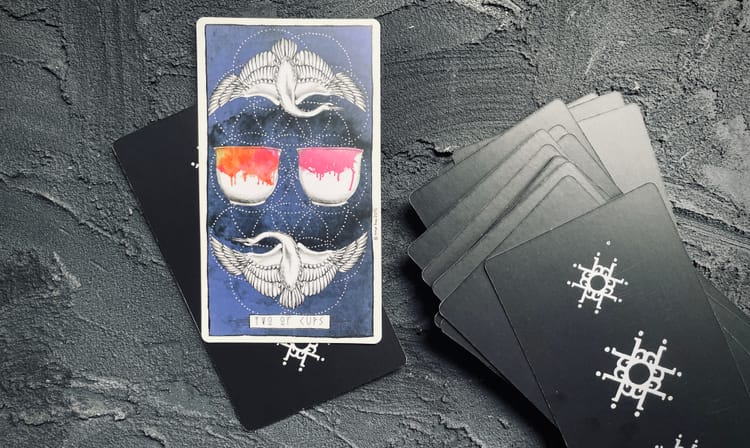


Member discussion